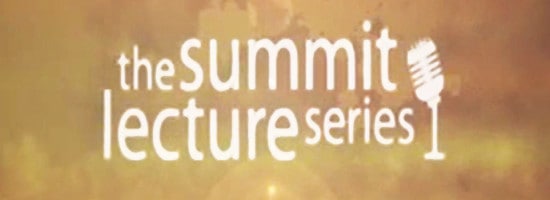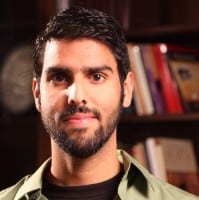
To purchase the entire DVD set of the Summit Lecture Series, visit summit.org.
I was born and raised Muslim in the United States. My parents immigrated here in the 70’s. In fact my dad came to the U.S. on the day that Elvis Presley died. He got off the plane and looked at the newsstand where every newspaper said, “The King Is Dead”. He was blown away.
“King? I thought they had a democracy here!?”
Both my mother and my father came here in complete ignorance of what life in the U.S. is like. All that they knew is that they could come here and receive freedom from oppression. They knew that this was the land of opportunity. And, even though me and my sister weren’t even born yet, they knew that they could give their children hope and opportunity by living in the United States of America.
You see, Islam is not a monolith. Too often, American Christians think of other world religions that are different than their own as one giant entity. But Islam has many different schisms and divisions within it. And the sect that my family came from is heavily persecuted by other sects of Islam.
So, my parents came here with little more than the shirts on their backs. Mom and Dad would go to McDonalds, take the Styrofoam containers that their burger would come in and take them home, wash them and use them as dishes. They had nothing. They had no one to lean on – no support at all.
Pretty much as soon as he arrived, my dad joined the U.S. Navy and served dutifully with his whole heart. There really are devout Muslims in our military who fight and give their all for our nation.
When I was born in 1983, like all devout Muslim families, my parents raised me from minute one as a Muslim. The first thing any Muslim child is supposed to hear, the second they are born, is the Shahada: “La ilaha illallah muhammadur rasulullah” (“There is no god but Allah, and Muhammed is his messenger.”) My father said that into each of my ears the moment that I was born. And then he did the call to prayer in both of my ears as well.
Now, not all Muslim families that come here are this devout. But, my mom was the daughter of a Muslim missionary. Her father spent his whole life preaching Islam in Indonesia. Her mother was born in Uganda, which made my mom a second generation “MK” or “Missionary Kid”.
This type of heritage, along with the typical mindset of immigrated minorities, instilled in me a natural inclination to defend myself with an ideological fortress. Like so many other minority communities, my parents raised me in a like-minded community, taught me and my sister how to define ourselves as Muslims, and how to defend ourselves from the public at large.
So, I grew up praying the five daily prayers, reading the Quran, and was even able to read Arabic before I learned how to speak English. By the age of five, I had read the entire Quran in Arabic, with many whole chapters completely memorized.
My parents had taught me that when I went into the public realm, it wouldn’t matter how good of a student I might be. I could be the best student in my entire class, but no one would ever see me and acknowledge me for my studies or how much I love my country. They would only see my skin color, my facial features, and they would only see me as a Muslim.
Therefore, I had to learn how to defend Islam.
Wherever I went, I was to be an ambassador for Islam. My parents taught me how to respond to any person who might try to share the Christian Gospel with me. I needed to be able to tell them exactly why I was a devout Muslim AND why they should convert to Islam as well.
I remember one moment in my junior year of high school. I was in class and this girl in front of me spins around and tells me, “Nabeel, do you know Jesus?”
I immediately thought she was crazy. It turned out she was on fire for the Lord… but it’s sometimes easy to confuse those two things.
“Yeah, I do know Jesus”, I replied. “I know Jesus was virgin-born. I know Jesus healed lepers. I know He cured the deaf and the blind; and I know Jesus raised the dead. I know that He is the Messiah and that He is coming back at the end of time to initiate judgment.
But I also know that He is not God.”
She said, “What do you mean He isn’t God? Of course, He’s God!”
You see, I was quoting to her the things that the Quran told me about Jesus. And while the Quran describes Him as all the things I admitted, it also clearly delineates that He is not God.
So, I told her, “Look, for a moment, let’s say I accept the Christian Gospel. Where, in any of the four Gospel accounts of Matthew, Mark, Luke or John does Jesus say He is God?”
And she had no idea. Nor did she have any idea on how to respond.
“Jesus did say, ‘The Father and I are one”, she finally replied.
I then argued, “Yeah, but in that same Gospel, the Book of John, Jesus prays for the disciples ‘to be one’, just as He is one with the Father. So, He’s not saying that He wants the disciples to become one person just as He is one person with the Father. He is saying that He wants the disciples to be unified in their spirit, just as He is unified with the Father. Therefore, we can’t say that He is claiming to be God in this passage. He’s just saying that they are like-minded. In fact, in another section of the Book of John, Jesus says, “The Father is greater than I”. How can God say that God is greater than God? It doesn’t make any sense. Or, what about in Mark 13, where Jesus says that He does not know when the ‘end of times’ is? He says ‘nobody knows – not the angels, nor the Son, but only the Father.’ Jesus is drawing a line of delineation between Himself and God. There’s a moment when Jesus doesn’t know who touched Him in a crowd. He wasn’t able to perform miracles in Galilee – when you read the Book of Mark carefully, you’ll see it says ‘He could do no miracles in Galilee.’”
So, I’m having this conversation with this girl who was absolutely on fire for the Lord, wanting to share the Gospel with everyone. But, she was entirely unable to respond to the simple question, “Why do you believe the most central part of your faith?”